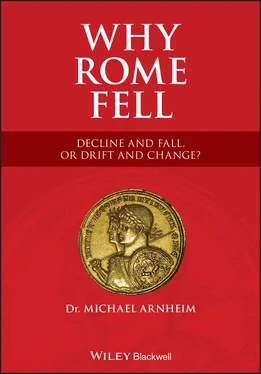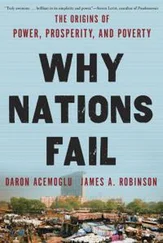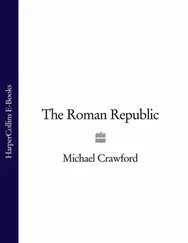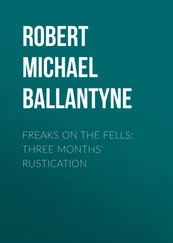Michael Arnheim - Why Rome Fell
Здесь есть возможность читать онлайн «Michael Arnheim - Why Rome Fell» — ознакомительный отрывок электронной книги совершенно бесплатно, а после прочтения отрывка купить полную версию. В некоторых случаях можно слушать аудио, скачать через торрент в формате fb2 и присутствует краткое содержание. Жанр: unrecognised, на английском языке. Описание произведения, (предисловие) а так же отзывы посетителей доступны на портале библиотеки ЛибКат.
- Название:Why Rome Fell
- Автор:
- Жанр:
- Год:неизвестен
- ISBN:нет данных
- Рейтинг книги:3 / 5. Голосов: 1
-
Избранное:Добавить в избранное
- Отзывы:
-
Ваша оценка:
- 60
- 1
- 2
- 3
- 4
- 5
Why Rome Fell: краткое содержание, описание и аннотация
Предлагаем к чтению аннотацию, описание, краткое содержание или предисловие (зависит от того, что написал сам автор книги «Why Rome Fell»). Если вы не нашли необходимую информацию о книге — напишите в комментариях, мы постараемся отыскать её.
Why Rome Fell: Decline and Fall, or Drift and Change?
Why Rome Fell
Why Rome Fell
Why Rome Fell — читать онлайн ознакомительный отрывок
Ниже представлен текст книги, разбитый по страницам. Система сохранения места последней прочитанной страницы, позволяет с удобством читать онлайн бесплатно книгу «Why Rome Fell», без необходимости каждый раз заново искать на чём Вы остановились. Поставьте закладку, и сможете в любой момент перейти на страницу, на которой закончили чтение.
Интервал:
Закладка:
Millar then provides us with “four fundamental points”:
1 Millar: “(F)irstly, elections to the consulship tell us a lot, but not everything, about Roman political life.” M.A. Granted. But whoever said that consular elections told us everything about elections? Millar’s point is a classic Aunt Sally or Straw Man.
2 Millar: “Secondly, other offices, and above all the tribunate, were also reflections of popular support, and vehicles of popular politics. M.A. Absolutely. The tribunate came into existence to protect the original plebeians in the Conflict of the Orders, the historicity of which Millar rejects. Later on, the tribunate became an important weapon used by Populares, demagogues with popular support like the Gracchi, against the Optimates, upholders of the dominant oligarchy, who finally lost out to Julius Caesar and then his heir, the future Augustus, who turned the oligarchic republic into a monarchy, all of which Millar rejected.
3 Millar: “(T)hirdly, the use of words, oratory, before the people, was central to the political process in Rome. M.A. Not at all. This is part of the illusion of the Roman Republic as essentially democratic. As Egon Flaig has shown (see above), the popular assemblies almost always agreed with the bills presented to them, on the basis of which Flaig denied that the assemblies were decision-making bodies, labelling them instead as “consensus-producing bodies.” (Egon Flaig 1995, 77–91; 2003, 155–74; 184–93.)
4 Millar: “(A)nd fourthly—the most important thing of all—the central focus of politics was not election to office but conflict about laws.” (Millar 2002, p. 178.) M.A. That there was a certain amount of conflict about laws is undeniable. Sometimes, this conflict turned violent, but this was all part and parcel of the conflict between Optimates and Populares, in which the latter (and, no doubt, the former as well) had lower class support. It is an illusion to see this conflict in terms of swaying voters by argument in debate. The violent conflict over the Gracchan reforms marked the beginning of the end of the oligarchic state that we know as the Roman Republic .
“Rem Publicam…in Senatus Populique Romani Arbitrium Transtuli”
Augustus’s vaunted restoration of the Republic : In his autobiography, Augustus claimed that, in 27 BCE, “I transferred the state from my own power to the control of the Roman Senate and People.” (Aug. R.G . 34.) Fergus Millar appears to have taken this literally, meaning the “…restoration of the citizen body to its rightful place within the constitutional structure of the res publica and its politics,” which “…provides the analytical framework for a very different understanding of what happened in 27 BC than we might gather from reading the Annals of Tacitus.” (Guy MacLean Rogers,“Intro: Polybius Was Right” –Millar 2002, p. xiv.) Rogers emphasizes the phrase “and the Roman people” as if that is in some way significant. This is a misunderstanding of the passage in Augustus’s autobiography, which is simply that he transferred the res publica (the state) from his own power to the arbitrium (discretion, or better, control or dominion) of the Senatus Populusque Romanus , (The Roman Senate and People) (SPQR), the traditional corporate designation of the Roman Republic. So, what Augustus is saying here is that he restored the Republic, which of course is false but which was a major theme in his propaganda. The mention of populusque (and the people), does not have any special significance.
Egypt : Rogers also makes much of the claim in Augustus’s autobiography that he had added Egypt “…to the imperium of the Roman people.” (Aug. R.G ., 27.) Why not again to the Roman Senate and People, SPQR? The omission of the “Senate” here is significant, but not for the reason that Rogers suggests. Augustus is certainly not claiming to have handed Egypt over to one of the popular assemblies. Egypt was newly conquered from Cleopatra (allied to Mark Antony), and Augustus ruled it as part of his own patrimonium (private estate) because he did not want the Senate or any senator to gain control of this rich province. So, the governor of Egypt was never a senator but always an equestrian with the title of “prefect”, and no senator was allowed even to set foot in Egypt without express imperial consent. How was Augustus to publicize his acquisition of Egypt in his autobiography? He could not very well say, “I added Egypt to my own private estate.” And he also did not want to say that he had given it to the Roman Senate and People, because then the Senate could have gotten its hands on it. So, he just said that he had added it to the imperium , of the Roman people. The term imperium in this context belongs to the category of what Lewis and Short call “publicists’ language,” with the multiple meanings of “supreme power, sovereignty, sway, dominion, and empire.” (Lewis and Short, s.v. imperium .) This had nothing to do with the popular assemblies but was simply a vague propaganda claim that Egypt was now under Roman control and the “people” certainly never had any say over Egypt or over who was to govern it.
“Ironic victory” : Rogers suggests that:
[I]t is possible to argue” that the Augustan “monarchy itself was one of the (unintended) consequences of the struggle between some of the nobiles and the populus Romanus over the question of who was the sovereign power in the res publica . If we look at the breakdown of the Roman Republic from this perspective, we might see the emergence of a monarch from among the nobiles in 27 BC as an ironic victory for that democratic element in the Roman constitution, the Roman people. (Millar 2002, loc. 206.)
This is muddled. The fall of the Roman Republic was indeed the victory over the senatorial aristocracy by the people’s champion, first Julius Caesar and then his heir, Augustus. But it makes little sense to suggest that this amounted to the victory of the “…democratic element in the Roman constitution, the Roman people.” Moreover, if the Roman people had exercised as much power in the Republic as Millar and Rogers seem to believe, why would they have wanted to destroy the Republic? Yet Julius Caesar had made no bones about his contempt for the Republic by accepting an indefinite dictatorship and by describing the Republic as just “…a name without substance or form.” Augustus’s victory was not of democracy but of a form of monarchy that artfully concealed its true nature and managed to survive, with some modifications, for some 300 years.
Mommsen’s “Dyarchy”
The famous German historian Theodor Mommsen (1817–1903) believed the Augustan regime was a “dyarchy” or “diarchy”, in which power was shared between Augustus and the Senate. This view is not generally accepted. My own view, as mentioned above, is that what Augustus established was a monarchical regime based, as we have seen, on a combination of wide powers, with authority resting on broad support from the plebs , the equites , and the army, together with at least toleration by the surviving members of the Republican senatorial aristocracy and the support of the new men whom he had helped to qualify for entry into the Senate.
Syme: “A Monarchy Rules through an Oligarchy”
Against Millar’s rejection of the characterisation of the Roman Republic as either an aristocracy or an oligarchy, we have this important statement by Sir Ronald Syme about the Roman Republic, based on detailed prosopographical evidence: “In any age of the history of Republican Rome about twenty or thirty men, drawn from a dozen dominant families, hold a monopoly of office and power.” (Syme 1939, p. 124.) In his much acclaimed The Roman Revolution , a book about the rise to power of Augustus, written in 1939, Syme portrayed Augustus as an autocrat in all but name. But then Syme went off at a tangent and proclaimed in ringing tones, without any evidential basis that “In all ages, whatever the form and name of government or whatever may be the name and theory of the constitution, be it monarchy, republic, or democracy, an oligarchy lurks behind the façade.” (1939, 7, 15.) Fifty years later, in 1989, his portrayal of Augustus’s regime was still the same, describing it as “autocratic government” and adding; “The Princeps duly went on to exploit the ‘res publica’, encroaching on the functions of Senate, of magistrates, of laws.” And:“‘Potentia’ now assumed the respectable name of ‘auctoritas’.” (Syme 1989, p. 1 f.)
Читать дальшеИнтервал:
Закладка:
Похожие книги на «Why Rome Fell»
Представляем Вашему вниманию похожие книги на «Why Rome Fell» списком для выбора. Мы отобрали схожую по названию и смыслу литературу в надежде предоставить читателям больше вариантов отыскать новые, интересные, ещё непрочитанные произведения.
Обсуждение, отзывы о книге «Why Rome Fell» и просто собственные мнения читателей. Оставьте ваши комментарии, напишите, что Вы думаете о произведении, его смысле или главных героях. Укажите что конкретно понравилось, а что нет, и почему Вы так считаете.












